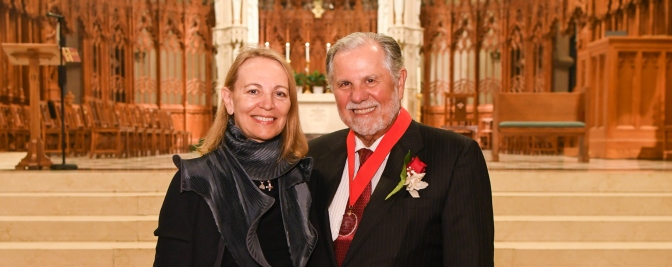Gift Secures Legal Training Based on Catholic Values for Deserving Seton Hall Law
Students
Over nearly five decades at Seton Hall Law, Professor Michael Ambrosio has inspired
the lawyer unique to Seton Hall Law — one who integrates jurisprudence into the everyday
practice of law and whose thinking is grounded in a Catholic view of justice.
“Absent wisdom and a moral foundation, lawyers can be a menace,” Ambrosio said. “So
I’ve always thought that Seton Hall should produce a lawyer who’s different — more
concerned about just outcomes than graduates of law schools that do not have a Catholic
tradition.”
Ambrosio’s distinguished practice and teaching careers have exemplified that tradition.
As a specialist in ethics and legal malpractice, he is known as the conscience of
the legal profession in New Jersey and beyond. At the law school, his courses on Professional
Responsibility and Law and Morality develop the intellectual basis and philosophical
commitment for students to practice their profession in a manner that benefits their
communities.
To ensure that students who desire the Seton Hall Law experience are able to attend,
Ambrosio and his wife, Janice Gordon, have committed $2,000,000 to establish an endowed
scholarship fund. Their gift will help generations of students for whom a Seton Hall
JD would otherwise be out of reach.
That’s of particular importance to Ambrosio: “Seton Hall Law has been growing in importance,
both in the state and as a nationally ranked law school. So I support anything we
can do to show that we’re striving for excellence in every way, and scholarship aid
to open the path for deserving students is a critical part of that.”
The gift is also a way of giving back since Ambrosio’s undergraduate and law school
costs were defrayed by various forms of tuition support. “I went to Montclair State
and my tuition was about $200 a semester, so that was a scholarship subsidy from the
government. And then I had a scholarship at Catholic University Law School,” he said.
And he added that recruiting students from across the socioeconomic spectrum will
improve not only Seton Hall Law but also the entire legal profession.
“Assisting needy students so they have the opportunity to attend the Law School is
in keeping with Michael’s belief in ‘equitable distribution,’” Janice said. “I, too,
appreciate the importance of giving students economic assistance, and I admire and
fully support Michael’s commitment in this regard.”
The law school’s ethics-based training is grounded by its relationship to the University,
according to Ambrosio, whose colleagues have included Monsignor Richard M. Liddy,
Ph.D., director of the Center for Catholic Studies, and the late William J. Toth,
Ph.D., with whom he taught a course at Immaculate Conception Seminary for several
years.
“Seton Hall itself has this goal of providing education of the mind, the heart and
the spirit; I’ve always loved that notion that it’s not education in any real sense
unless it’s going to elevate us and make us understand that we’re spiritual beings
in a material existence,” he said.
Professor Ambrosio and his wife’s recent philanthropy will ensure that Michael’s ideas
about Catholicism’s relationship to law and morality continue to find expression at
the law school even after his career draws to a close.
“I’ve had a career that was interesting and varied — ultimately combining academic
work with practical lawyering so the two have really enhanced each other,” he said.
“I embrace the notion of giving back out of gratitude; no one could have had a better
position than I did as a professor of law. It’s a privilege.”






